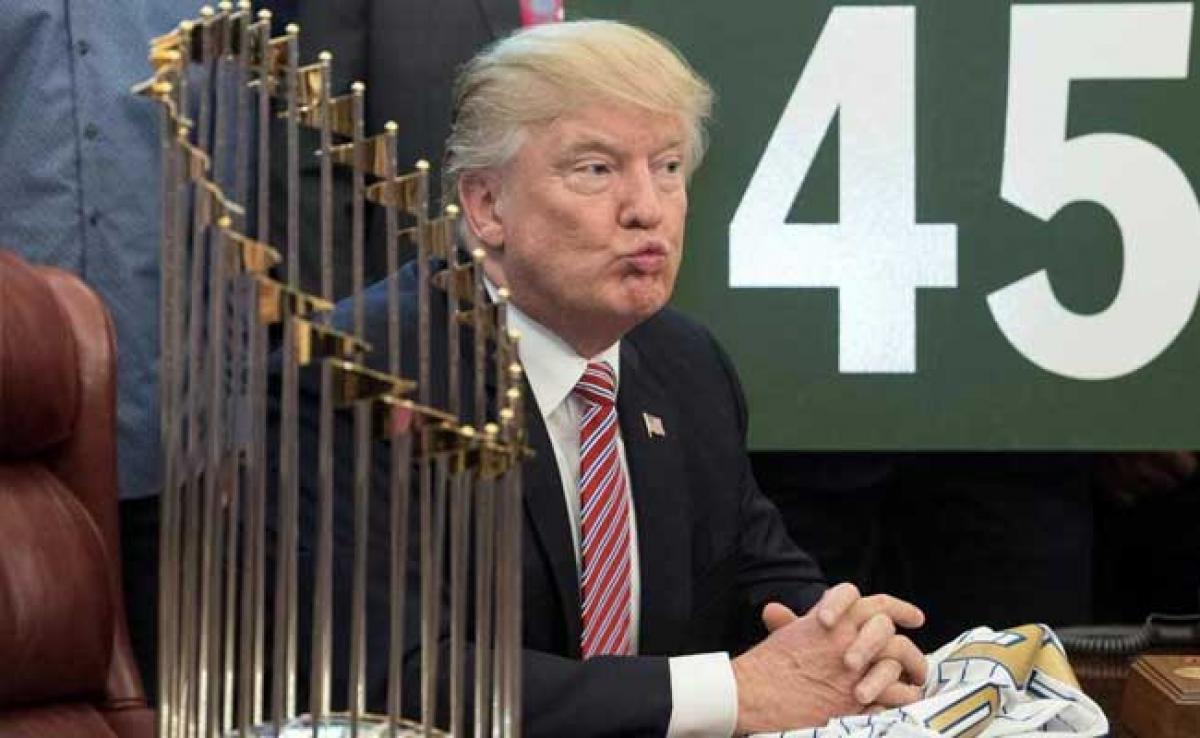Live
- WHO reports declining monkeypox cases in Congo
- CM Attends Kotideepotsavam on Kartika Purnima
- PKL Season 11: Raiding trio of Devank, Ayan, Sandeep help Patna Pirates rout Bengal Warriorz
- Food waste crisis fuels sustainable practices across APAC food & beverage industry: Report
- AI helps erase racist deed restrictions in California
- ATMIS completes third phase of troops' drawdown in Somalia
- PM Kisan Samman Nidhi scheme bringing smile to Nalanda farmers
- German economy forecast to lag eurozone growth until 2026
- CM Shinde orders stern action against hoarding of onions amid rising prices
- Protest rallies in Manipur against 'mass killing of 10 village volunteers'
Just In

It was a constant refrain on the campaign trail for Donald Trump in his quest for the US presidency: \"We\'re going to have a great relationship with Putin and Russia.\"
It was a constant refrain on the campaign trail for Donald Trump in his quest for the US presidency: "We're going to have a great relationship with Putin and Russia."
Now, weighed down by claims that Moscow helped put him in the White House, Trump is set to finally meet his Russian counterpart in an encounter fraught with potential danger for the struggling American leader.
The talks are due to take place late Friday on the sidelines of the G20 summit in Hamburg, Germany.
There should be no shortage of subjects to discuss, including the conflicts in Syria and Ukraine, North Korea's nuclear program and efforts to combat terrorism.
But for Trump, the main challenge will be how to improve ties with Putin without seemingly going soft on a man who American intelligence agencies say oversaw a massive effort to influence the outcome of last year's US elections.
"Trump needs to be polite but firm and not too friendly," said Michael O'Hanlon, a Russia expert at the Brookings Institution.
"If he wants to improve US-Russia relations down the road, he needs to convey the gravity of his concerns about recent Russian behavior first. Otherwise, Putin may think he's a pushover, and the Congress will rise in opposition to Trump's Russia policy."
Trump's surprise election in November was expected to have heralded an upturn in relations between Moscow and Washington.
But ties that had chilled under Barack Obama have become even frostier, with Russia's backing for President Bashar al-Assad in Syria a particular source of friction.
Moscow was furious when the Trump administration launched a cruise missile strike against Syrian forces in April, in retaliation for what Washington said was a chemical weapons attack by Assad's regime against civilians.
Talks between senior US and Russian diplomats that had been set for last month were cancelled by Moscow in the wake of Washington's decision to reinforce sanctions imposed over Russian interference in Ukraine and its occupation of Crimea.
And an FBI investigation into whether Trump's campaign team colluded with Moscow during the election -- claims the president has dismissed as "fake news" -- have further complicated matters.
Trump has yet to hand back two Russian diplomatic compounds in Maryland and New York that were impounded on Obama's orders in December as evidence emerged of election meddling.
But while the portents may not be great, both sides do appear keen to make some headway.
- 'Constructive relationship' -
Senior Putin aide Yuri Ushakov has said the meeting should be crucial for international stability and it was in both sides' interests "to break the current impasse in bilateral relations."
HR McMaster, Trump's national security advisor, said there is no specific agenda for the talks and the main aim is to forge a "more constructive relationship" while also confronting Moscow over its "destabilizing behavior."
The pair could find common ground when discussing how to deal with the Islamic State group whose last strongholds -- Mosul in Iraq and Raqa in Syria -- appear to be on the verge of collapse.
But for the 71-year-old Trump -- still an absolute novice when it comes to diplomacy -- the optics of the meeting with a leader who has been in power for nearly two decades will be sensitive.
Trump was embarrassed back in May when he was accused of revealing sensitive intelligence information to Russian Foreign Minister Sergei Lavrov at a White House meeting.
For O'Hanlon, the best that could be hoped from Friday's meeting is a slight thaw in relations and the two men possibly striking up some kind of chemistry despite the toxic background.
"I can't imagine any issues they can actually make major headway on, given the poison that surrounds the relationship," he said.
"And so I hope that they can at least begin to develop a personal rapport that allows maybe the next conversation to get into substance on Syria, because there really isn't that much time to waste."

© 2024 Hyderabad Media House Limited/The Hans India. All rights reserved. Powered by hocalwire.com







